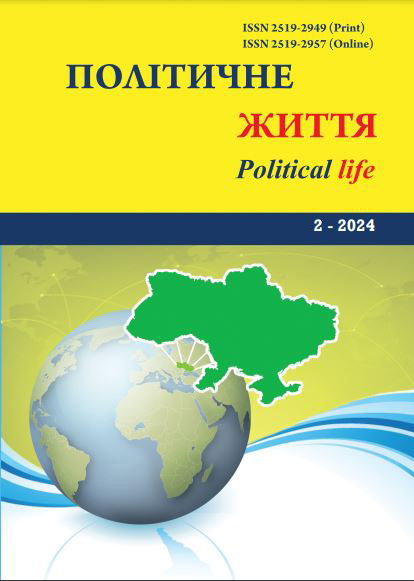The russian model of "limitless" hybrid warfare: main characteristics
DOI:
https://doi.org/10.31558/2519-2949.2024.2.1Keywords:
hybrid war, Russian hybrid aggression, Russian-Ukrainian war, humanitarian policy, racism, propaganda, separatism, deportation, filtering, genocide of the Ukrainian people, international lawAbstract
The achievements of the discourse on the understanding of the phenomenon of hybrid war are systematized. The main characteristics of the Russian model of hybrid warfare are defined and substantiated. Such characteristics include: 1) creation of closed-type quasi-reality within one’s country and in the occupied territories by propaganda and repressive means; 2) undermining the legitimacy of the government and fanning intrastate contradictions in the territory of the victim of aggression; creeping expansion with the creation of pseudo-republics, support and use of separatist-terrorist groups; protection of "compatriots", "fellow citizens", sanctified by the ideology of the so-called "Russian peace" also using the preservation and strengthening of the economic dependence of the former Soviet republics, the penetration of Russian capital into strategic sectors of national economies; 3) replacing hybrid aggression with the concept of "civil war", the aggressor identifying himself as a "peacemaker" and mediator, attributing the role of the attacker to the object of the attack – the Russian authorities qualified the events of 2013–2014 as a "coup d’état", the coming to power in Kyiv of "juntas", "civil war", etc.; 4) blurring the differences between the state of war and peace under the guise of a "special military operation"; manipulation of democratic standards, humanitarian policy in order to justify mass lies, crimes against humanity, genocide of the Ukrainian people and forced relocation of Ukrainians, including to the Russian Federation; 5) restoration of the Cold War world order with the corresponding polarization of the world and arbitrary interpretation of the norms of international law. Directions for countering hybrid war are proposed, taking into account synchronous and asynchronous methods and means of resisting aggression and ensuring the system of national security and collective European security for the long term.
References
Walker, R.G. SPEC FI: the United States Marine Corps and Special Operations. Naval Postgraduate School. Monterey, California, December 1998. URL: https://calhoun.nps.edu/bitstream/handle/10945/8989/specfiunitedstat00 walk.pdf?sequence=1 (дата звернення: 24.05.2024).
Nemeth W.J. Future War and Chechnya: A Case for Hybrid Warfare. Monterey, CA: Naval Postgraduate School, June 2002. URL: https://calhoun.nps.edu/bitstream/handle/10945/5865/02Jun_Nemeth.pdf?sequence= 1&isAllowed=y(дата звернення: 24.05.2024).
Hoffman F. Conflict in the 21st Century: The Rise of Hybrid Wars. Arlington : Potomac Institute for Policy Studies, 2007. 72 p.
Любиченко О. О. Гібридна війна Росії проти України: інформаційний аспект. Наукові перспективи. 2022. № 9 (27). С. 139–147.
Горбатенко В. П. Гібридна війна. Велика українська енциклопедія. URL: https://vue.gov.ua/Гібридна війна (дата звернення: 26.05.2024).
Світова гібридна війна: український фронт: монографія; за заг. ред. В. П. Горбуліна. Київ: НІСД, 2017. 496 с.
Киричок А. Гібридна війна як феномен військово-інформаційної думки ХХІ ст. (історичні та теоретичні аспекти). Держава та регіони. Серія: Соціальні комунікації. 2017. № 2. С. 26 – 30.
Томас Венцлова, Леонідас Донскіс. Передчуття і пророцтва Східної Європи. Пер. з литовськоїмови Георгія Єфремова, Олега Коцарева. К.: ДУХ І ЛІТЕРА, 2016. 120 с.
Режим Путіна перед викликами часу: аналітична доповідь. За заг. ред. М. М. Розумного. Київ: НІСД, 2017. 84 с.
Лазарович М., Мироненко П. Московитсько-українська війна (2014–2024 роки): моногр. 4-те вид., переробл. Київ: Політія, 2024. 520 с.
Deportation of Ukrainian citizens from the territory of active military operations or from the temporarily occupied territory of Ukraine to the territory of the Russian Federation and the Republic of Belarus. Analytical report. https://zmina.ua/wp-content/uploads/sites/2/2023/01/deportation_eng.pdf (дата звернення: 18.04.2024).
Лубінець розповів, скільки дітей вивезли в РФ і яку нову тактику застосовує Москва. Радіо Свобода. 07 грудня 2023. https://www.radiosvoboda.org/a/news-rosiya-deportatsia-ditey-lubinets/32720921.html) (дата звернення: 14.04.2024).
Грані агресії: деякі узагальнення досвіду російсько-української війни 2014–2024 років; за ред. д. політ. н. Мироненка П. В., д. політ. н., проф. Мокляка С. П. Київ: Вид-во Політія, 2024. 395 с.
Ткаченко В. М. Рашизм: ліцензія на геноцид. Есеї. Науково-популярне видання. Київ: Видавництво Політія, 2023. 348 с.
Горбатенко В. Футурологія і політика: монографія. Київ: Академвидав, 2019. 288 с.

